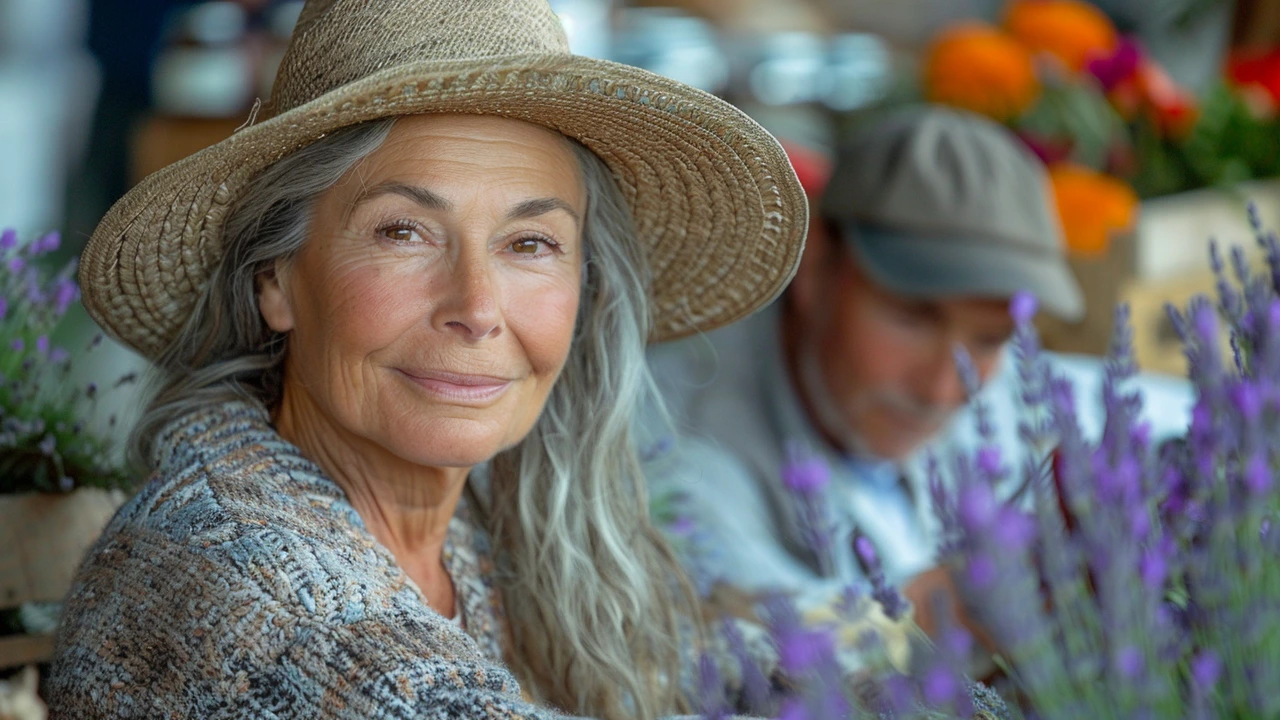Healing Touch: Your Essential Guide to Natural Healing Techniques

- Jun, 13 2024
- 0 Comments
- Ferdinand Kingsley
In a world where pharmaceuticals often dominate the conversation around health, natural healing provides a refreshing alternative. Whether you're new to the concept or looking to deepen your understanding, this guide offers a comprehensive look at how you can use nature to support your well-being.
From ancient practices to modern-day applications, natural healing encompasses a wide range of techniques designed to bring balance and restore health. Let's explore some of these methods and discover how they can become a beneficial part of your lifestyle.
- Introduction to Natural Healing
- Popular Techniques and Practices
- Benefits of Natural Healing
- Tips for Incorporating Natural Healing into Your Life
Introduction to Natural Healing
Natural healing is an approach that aims to harness the inherent power of nature to promote health and wellness. This method dates back thousands of years and is rooted in ancient traditions and practices. Unlike conventional medicine, which often focuses on treating symptoms, natural healing takes a holistic approach designed to address the root causes of illness and imbalance.
The philosophy behind natural healing is simple: the body has an innate ability to heal itself when given the right tools and environment. This includes a variety of practices such as using medicinal herbs, maintaining a balanced diet, engaging in regular physical activity, and practicing mindfulness and relaxation techniques. These methods are often seen as safer alternatives to pharmaceuticals, which can come with a variety of side effects.
One fascinating aspect of natural healing is its emphasis on the interconnectedness of the body, mind, and spirit. It's about finding harmony within oneself and the environment. Ancient healing systems like Traditional Chinese Medicine (TCM) and Ayurveda have long recognized this interconnectedness, prescribing treatments that consider the patient's physical, emotional, and spiritual well-being.
Holistic health practitioners often include dietary changes as a primary step towards healing. For instance, a diet rich in whole foods, fruits, vegetables, and lean proteins can significantly boost the immune system. These dietary principles align with modern nutritional science, which champions the benefits of antioxidants and essential nutrients in preventing diseases and promoting longevity.
Another cornerstone of natural healing is the use of medicinal herbs and plants. Remedies like ginger, turmeric, and echinacea have been used for centuries to treat various ailments. Today, many of these herbs are still in use and are supported by scientific research. For example, the anti-inflammatory properties of turmeric are well-documented, making it a popular choice for those suffering from arthritis and other inflammatory conditions.
One respected voice in the field, Dr. Andrew Weil, often highlights the importance of integrating natural healing practices into daily life. He states, "The future of medicine lies in exploiting the body’s own amazing healing system to create genuine health."
Mindfulness and stress reduction are also vital components of natural healing. Practices such as meditation, yoga, and tai chi are more than just ways to relax; they actively contribute to better health by reducing stress hormones and improving overall well-being. With the rising awareness of mental health issues, these practices have become increasingly important.
In today's fast-paced world, many people are turning to natural healing methods as a way to reconnect with their bodies and find balance. Whether through diet, herbal medicine, or mindfulness, these practices offer a holistic approach that can complement conventional treatments and lead to a healthier, more harmonious life.

Popular Techniques and Practices
Natural healing encompasses a variety of techniques that have stood the test of time. Some of these practices date back centuries, rooted in different cultural traditions, while others incorporate modern scientific insights. These methods are known for their ability to promote physical, emotional, and mental well-being naturally and holistically. Let's delve into some of the most popular techniques and practices that people around the globe rely on to enhance their health.
Acupuncture: This ancient Chinese practice involves inserting thin needles into specific acupuncture points on the body. It is believed to balance the body's energy or 'Qi' and has been found to be effective in treating pain, migraines, and stress among other conditions. Acupuncture stimulates the central nervous system, releasing chemicals into the muscles, spinal cord, and brain, which may boost the body's natural healing abilities.
For example, a 2012 study published in the Archives of Internal Medicine found that acupuncture is effective in treating chronic pain and is therefore a reasonable referral option. The benefits have been seen in a range of contexts, from reducing chemotherapy-induced nausea to lessening lower back pain.
Herbal Medicine
Plants have been used in healing practices for thousands of years. Today, herbal medicine is making a comeback as people look for more natural ways to treat common ailments. Herbs such as ginger, turmeric, and peppermint have powerful healing properties. Ginger, for instance, is known for its anti-inflammatory and antioxidant effects. Regular use of turmeric can help with a range of conditions, including arthritis and digestive issues. Peppermint, on the other hand, is often utilized for its ability to soothe an upset stomach or relieve tension headaches.Renowned herbalist, David Hoffman, once said,
'Herbal medicine does not replace conventional remedies but offers complementary benefits that address many health issues at their root.'Such quotes underscore the integration of herbal remedies into everyday health practices.
Aromatherapy: This technique utilizes essential oils derived from plants to promote health and well-being. These oils can be inhaled or applied to the skin through massage. Lavender, known for its calming effects, is commonly used to reduce anxiety and improve sleep quality. Eucalyptus oil, which has anti-inflammatory properties, is often used in treating respiratory issues. The efficacy of aromatherapy lies in its ability to impact the limbic system, the part of the brain that controls emotions, thereby influencing both mental and physical health.
Meditation and Mindfulness
Meditation and mindfulness practices have been shown to reduce stress, improve concentration, and promote emotional health. By focusing the mind and eliminating the stream of jumbled thoughts, meditation can result in enhanced physical well-being. Regular practice can lower blood pressure, improve heart rate, and even boost immunity. Mindfulness, which involves being fully present and engaged in the moment, can help manage stress, anxiety, and depression.For example, an eight-week study published in the Journal of the American Medical Association found that mindfulness meditation programs had moderate evidence of improving anxiety, depression, and pain. These findings support the idea that integrating mindfulness and meditation into daily routines can have immense health benefits.
Yoga: Yoga combines physical postures, breathing exercises, and meditation to improve overall health. Originating in ancient India, yoga has become a global phenomenon due to its holistic benefits. It can enhance flexibility, strength, and balance while promoting relaxation and reducing stress. Yoga's emphasis on breath control and mindfulness aligns it closely with meditation practices, making it a comprehensive tool for natural healing.
Studies have shown that regular yoga practice can decrease the secretion of cortisol, the primary stress hormone. By lowering cortisol levels, yoga can help alleviate stress and its various impacts on the body.

Benefits of Natural Healing
Natural healing methods offer a holistic approach to wellness that can have a variety of benefits for your body and mind. These benefits stem from using treatments that work in harmony with the body's natural processes rather than against them. One of the key advantages is the reduction of side effects. Conventional medicines, while effective, often come with a long list of potential side effects. In contrast, natural remedies, like herbal treatments and acupuncture, typically have fewer and less severe side effects.
Another significant benefit of natural healing is its emphasis on prevention. By focusing on lifestyle, diet, and stress management, natural healing practices aim to prevent illnesses before they start. This proactive approach can lead to a more sustainable state of health and well-being. For instance, meditation and yoga not only help in reducing stress but also improve immune function, thus preventing a myriad of stress-related illnesses.
Natural healing also promotes personal empowerment. When individuals engage in practices like herbalism or aromatherapy, they learn more about their bodies and how to take control of their health. This growing awareness and self-understanding foster a sense of confidence and autonomy. According to the National Center for Complementary and Integrative Health, “Natural healing approaches often involve personalized care and support that can be empowering and beneficial for many people.”
Environmental mindfulness is another benefit. Many natural healing practices are eco-friendly and sustainable. Herbal remedies rely on plant-based ingredients that can be grown organically, reducing the environmental impact compared to the production of synthetic pharmaceuticals. Similarly, practices like acupuncture and reiki do not rely on resources that have a significant carbon footprint.
Additionally, natural healing can be a cost-effective option. Treatments such as homeopathy, nutritional adjustments, and regular physical activity require less financial investment compared to frequent doctor visits or prescription medications. Over time, the cost savings can be substantial, making it accessible for broader populations who might struggle with healthcare costs.
Natural therapies also often provide a more personalized approach to health. Conventional medicine tends to focus on treating symptoms, whereas natural healing looks at the person as a whole. This means considering emotional, mental, and spiritual health alongside physical health. For example, therapies such as Ayurveda and Traditional Chinese Medicine (TCM) are rooted in understanding each individual's unique constitution and tailoring treatments accordingly.
Finally, the longevity and historical success of many natural healing practices provide peace of mind. Techniques like acupuncture and herbal medicine have been used for centuries, providing a vast wealth of knowledge and proven efficacy that modern practices are only beginning to understand fully. Knowing that these methods have stood the test of time can be reassuring for those seeking alternative health solutions.

Tips for Incorporating Natural Healing into Your Life
Incorporating natural healing into your daily routine can be a rewarding and beneficial experience. First and foremost, it's important to understand that natural healing is not a quick fix but a gradual process. Begin by educating yourself on various natural healing methods. Reading books, attending workshops, and connecting with like-minded individuals can provide valuable insights. This foundation will enable you to make informed decisions about which techniques align with your lifestyle and health goals.
One simple yet effective way to start is by focusing on your diet. Eating whole, unprocessed foods is a cornerstone of holistic health. Foods rich in vitamins, minerals, and antioxidants can boost your immune system and overall wellness. Organic fruits and vegetables, whole grains, nuts, and seeds should make up the bulk of your diet. Additionally, consider reducing or eliminating processed foods, artificial additives, and sugars, which can negatively impact your health.
Herbal remedies are another excellent addition. Herbs like turmeric, ginger, and echinacea have been used for centuries to heal and protect the body. These natural remedies can improve digestion, reduce inflammation, and strengthen your immune system. Consult with an herbalist to create a personalized herbal regimen tailored to your unique needs.
Practicing mindfulness and stress-reduction techniques is crucial. Stress has a significant impact on our physical and mental health. Meditation, deep-breathing exercises, and yoga are powerful tools to reduce stress and promote relaxation. Creating a daily practice, even if it's just a few minutes, can profoundly affect your well-being. A study published in JAMA Internal Medicine found that mindfulness meditation can improve anxiety and depression symptoms, offering a natural way to boost mental health.
Regular physical activity is also a key component. Engaging in activities like walking, cycling, or swimming can enhance your physical health and mental clarity. No need to stick to a rigid schedule – find activities you enjoy and aim to incorporate them into your routine. The Centers for Disease Control and Prevention (CDC) recommends at least 150 minutes of moderate aerobic activity a week. This can improve cardiovascular health, help manage weight, and increase energy levels.
Another important aspect is ensuring adequate sleep. Quality sleep is essential for the body to repair and rejuvenate. Aim for 7-9 hours of uninterrupted sleep per night. Establish a calming bedtime routine, create a comfortable sleep environment, and avoid screens before bed. These steps can significantly improve your sleep quality.
“Sleep is the golden chain that ties health and our bodies together.” – Thomas Dekker
Finally, don't underestimate the power of community and support. Surround yourself with positive influences who support your natural healing journey. Join groups or online communities focused on natural healing and wellness. Sharing your experiences and learning from others can provide motivation and encouragement.
As you integrate these tips into your life, remember to be patient with yourself. Natural healing is a journey, not a destination. Each small step brings you closer to a healthier, more balanced life. Stay curious, keep learning, and enjoy the process of healing naturally.